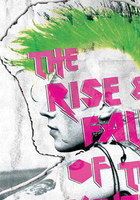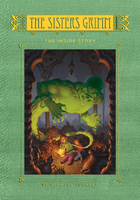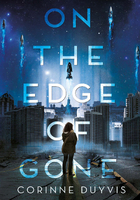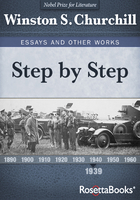There was a little snow on the ground, and the church clock had just struck midnight. Hampstead in the night of winter for once was looking pretty, with clean white earth and lamps for moon, and dark sky above the lamps.
A confused little sound of voices, a gleam of hidden yellow light. And then the garden door of a tall, dark Georgian house suddenly opened, and three people confusedly emerged. A girl in a dark blue coat and fur turban, very erect: a fellow with a little dispatch-case, slouching: a thin man with a red beard, bareheaded, peering out of the gateway down the hill that swung in a curve downwards towards London.
"Look at it! A new world!" cried the man in the beard, ironically, as he stood on the step and peered out.
"No, Lorenzo! It's only white-wash!" cried the young man in the overcoat. His voice was handsome, resonant, plangent, with a weary sardonic touch. As he turned back his face was dark in shadow.
The girl with the erect, alert head, like a bird, turned back to the two men.
"What was that?" she asked, in her quick, quiet voice.
"Lorenzo says it's a new world. I say it's only white-wash," cried the man in the street.
She stood still and lifted her woolly, gloved finger. She was deaf and was taking it in.
Yes, she had got it. She gave a quick, chuckling laugh, glanced very quickly at the man in the bowler hat, then back at the man in the stucco gateway, who was grinning like a satyr and waving good-bye.
"Good-bye, Lorenzo!" came the resonant, weary cry of the man in the bowler hat.
"Good-bye!" came the sharp, night-bird call of the girl.
The green gate slammed, then the inner door. The two were alone in the street, save for the policeman at the corner. The road curved steeply downhill.
"You'd better mind how you step!" shouted the man in the bowler hat, leaning near the erect, sharp girl, and slouching in his walk. She paused a moment, to make sure what he had said.
"Don't mind me, I'm quite all right. Mind yourself!" she said quickly. At that very moment he gave a wild lurch on the slippery snow, but managed to save himself from falling. She watched him on tiptoes of alertness. His bowler hat bounced away in the thin snow. They were under a lamp near the curve. As he ducked for his hat he showed a bald spot, just like a tonsure, among his dark, thin, rather curly hair. And when he looked up at her, with his thick black brows sardonically arched, and his rather hooked nose self-derisive, jamming his hat on again, he seemed like a satanic young priest. His face had beautiful lines, like a faun, and a doubtful martyred expression. A sort of faun on the Cross, with all the malice of the complication.
"Did you hurt yourself?" she asked in her quick, cool, unemotional way.
"No!" he shouted derisively.
"Give me the machine, won't you?" she said, holding out her woolly hand. "I believe I'm safer."
"Do you want it?" he shouted.
"Yes, I'm sure I'm safer."
He handed her the little brown dispatch-case, which was really a Marconi listening machine for her deafness. She marched erect as ever. He shoved his hands deep in his overcoat pockets and slouched along beside her, as if he wouldn't make his legs firm. The road curved down in front of them, clean and pale with snow under the lamps. A motorcar came churning up. A few dark figures slipped away into the dark recesses of the houses, like fishes among rocks above a sea-bed of white sand. On the left was a tuft of trees sloping upwards into the dark.
He kept looking around, pushing out his finely shaped chin and his hooked nose as if he were listening for something. He could still hear the motor-car climbing on to the Heath. Below was the yellow, foul-smelling glare of the Hampstead Tube Station. On the right the trees.
The girl, with her alert pink-and-white face, looked at him sharply, inquisitively. She had an odd nymph-like inquisitiveness, sometimes like a bird, sometimes a squirrel, sometimes a rabbit: never quite like a woman. At last he stood still, as if he would go no farther. There was a curious, baffled grin on his smooth, cream-coloured face.
"James," he said loudly to her, leaning towards her ear. "Do you hear somebody laughing?"
"Laughing?" she retorted quickly. "Who's laughing?"
"I don't know. Somebody!" he shouted, showing his teeth at her in a very odd way.
"No, I hear nobody," she announced.
"But it's most extraordinary!" he cried, his voice slurring up and down. "Put on your machine."
"Put it on?" she retorted. "What for?"
"To see if you can hear it," he cried.
"Hear what?"
"The laughing. Somebody laughing. It's most extraordinary."
She gave her odd little chuckle and handed him her machine. He held it while she opened the lid and attached the wires, putting the band over her head and the receivers at her ears, like a wireless operator. Crumbs of snow fell down the cold darkness. She switched on: little yellow lights in glass tubes shone in the machine. She was connected, she was listening. He stood with his head ducked, his hands shoved down in his overcoat pockets.
Suddenly he lifted his face and gave the weirdest, slightly neighing laugh, uncovering his strong, spaced teeth, and arching his black brows, and watching her with queer, gleaming, goat-like eyes.
She seemed a little dismayed.
"There!" he said. "Didn't you hear it?"
"I heard you!" she said, in a tone which conveyed that that was enough.
"But didn't you hear it!" he cried, unfurling his lips oddly again.
"No!" she said.
He looked at her vindictively, and stood again with ducked head. She remained erect, her fur hat in her hand, her fine bobbed hair banded with the machine-band and catching crumbs of snow, her odd, bright-eyed, deaf nymph's face lifted with blank listening.
"There!" he cried, suddenly jerking up his gleaming face. "You mean to tell me you can't—" He was looking at her almost diabolically. But something else was too strong for him. His face wreathed with a startling, peculiar smile, seeming to gleam, and suddenly the most extraordinary laugh came bursting out of him, like an animal laughing. It was a strange, neighing sound, amazing in her ears. She was startled, and switched her machine quieter.
A large form loomed up: a tall, clean-shaven young policeman.
"A radio?" he asked laconically.
"No, it's my machine. I'm deaf!" said Miss James quickly and distinctly. She was not the daughter of a peer for nothing.
The man in the bowler hat lifted his face and glared at the fresh-faced young policeman with a peculiar white glare in his eyes.
"Look here!" he said distinctly. "Did you hear someone laughing?"
"Laughing? I heard you, sir."
"No, not me." He gave an impatient jerk of his arm, and lifted his face again. His smooth, creamy face seemed to gleam, there were subtle curves of derisive triumph in all its lines. He was careful not to look directly at the young policeman. "The most extraordinary laughter I ever heard," he added, and the same touch of derisive exultation sounded in his tones.
The policeman looked down on him cogitatingly.
"It's perfectly all right," said Miss James coolly. "He's not drunk. He just hears something that we don't hear."
"Drunk!" echoed the man in the bowler hat, in profoundly amused derision. "If I were merely drunk—" And off he went again in the wild, neighing, animal laughter, while his averted face seemed to flash.
At the sound of the laughter something roused in the blood of the girl and of the policeman. They stood nearer to one another, so that their sleeves touched and they looked wonderingly across at the man in the bowler hat. He lifted his black brows at them.
"Do you mean to say you heard nothing?" he asked.
"Only you," said Miss James.
"Only you, sir!" echoed the policeman.
"What was it like?" asked Miss James.
"Ask me to describe it!" retorted the young man, in extreme contempt. "It's the most marvellous sound in the world."
And truly he seemed wrapped up in a new mystery.
"Where does it come from?" asked Miss James, very practical.
"Apparently," it answered in contempt, "from over there." And he pointed to the trees and bushes inside the railings over the road.
"Well, let's go and see!" she said. "I can carry my machine and go on listening."
The man seemed relieved to get rid of the burden. He shoved his hands in his pockets again and sloped off across the road. The policeman, a queer look flickering on his fresh young face, put his hand round the girl's arm carefully and subtly, to help her. She did not lean at all on the support of the big hand, but she was interested, so she did not resent it. Having held herself all her life intensely aloof from physical contact, and never having let any man touch her, she now, with a certain nymph-like voluptuousness, allowed the large hand of the young policeman to support her as they followed the quick wolf-like figure of the other man across the road uphill. And she could feel the presence of the young policeman, through all the thickness of his dark-blue uniform, as something young and alert and bright.
When they came up to the man in the bowler hat, he was standing with his head ducked, his ears pricked, listening beside the iron rail inside which grew big black holly trees tufted with snow, and old, ribbed, silent English elms.
The policeman and the girl stood waiting. She was peering into the bushes with the sharp eyes of a deaf nymph, deaf to the world's noises. The man in the bowler hat listened intensely. A lorry rolled downhill, making the earth tremble.
"There!" cried the girl, as the lorry rumbled darkly past. And she glanced round with flashing eyes at her policeman, her fresh soft face gleaming with startled life. She glanced straight into the puzzled, amused eyes of the young policeman. He was just enjoying himself.
"Don't you see?" she said, rather imperiously.
"What is it, Miss?" answered the policeman.
"I mustn't point," she said. "Look where I look."
And she looked away with brilliant eyes, into the dark holly bushes. She must see something, for she smiled faintly, with subtle satisfaction, and she tossed her erect head in all the pride of vindication. The policeman looked at her instead of into the bushes. There was a certain brilliance of triumph and vindication in all the poise of her slim body.
"I always knew I should see him," she said triumphantly to herself.
"Whom do you see?" shouted the man in the bowler hat.
"Don't you see him too?" she asked, turning round her soft, arch, nymph-like face anxiously. She was anxious for the little man to see.
"No, I see nothing. What do you see, James?" cried the man in the bowler hat, insisting.
"A man."
"Where?"
"There. Among the holly bushes."
"Is he there now?"
"No! He's gone."
"What sort of a man?"
"I don't know."
"What did he look like?"
"I can't tell you."
But at that instant the man in the bowler hat turned suddenly, and the arch, triumphant look flew to his face.
"Why, he must be there!" he cried, pointing up the grove. "Don't you hear him laughing? He must be behind those trees."
And his voice, with curious delight, broke into a laugh again, as he stood and stamped his feet on the snow, and danced to his own laughter, ducking his head. Then he turned away and ran swiftly up the avenue lined with old trees.
He slowed down as a door at the end of a garden path, white with untouched snow, suddenly opened, and a woman in a long-fringed black shawl stood in the light. She peered out into the night. Then she came down to the low garden gate. Crumbs of snow still fell. She had dark hair and a tall dark comb.
"Did you knock at my door?" she asked of the man in the bowler hat.
"I? No!"
"Somebody knocked at my door."
"Did they? Are you sure? They can't have done. There are no footmarks in the snow."
"Nor are there!" she said. "But somebody knocked and called something."
"That's very curious," said the man. "Were you expecting someone?"
"No. Not exactly expecting anyone. Except that one is always expecting Somebody, you know." In the dimness of the snow-lit night he could see her making big, dark eyes at him.
"Was it someone laughing?" he said.
"No. It was no one laughing, exactly. Someone knocked, and I ran to open, hoping as one always hopes, you know—"
"What?"
"Oh—that something wonderful is going to happen."
He was standing close to the low gate. She stood on the opposite side. Her hair was dark, her face seemed dusky, as she looked up at him with her dark, meaningful eyes.
"Did you wish someone would come?" he asked.
"Very much," she replied, in her plangent Jewish voice. She must be a Jewess.
"No matter who?" he said, laughing.
"So long as it was a man I could like," she said, in a low, meaningful, falsely shy voice.
"Really!" he said. "Perhaps after all it was I who knocked—without knowing."
"I think it was," she said. "It must have been."
"Shall I come in?" he asked, putting his hand on the little gate.
"Don't you think you'd better?" she replied.
He bent down, unlatching the gate. As he did so the woman in the black shawl turned, and, glancing over her shoulder, hurried back to the house, walking unevenly in the snow, on her high-heeled shoes. The man hurried after her, hastening like a hound to catch up.
Meanwhile the girl and the policeman had come up. The girl stood still when she saw the man in the bowler hat going up the garden walk after the woman in the black shawl with the fringe.
"Is he going in?" she asked quickly.
"Looks like it, doesn't it?" said the policeman.
"Does he know that woman?"
"I can't say. I should say he soon will," replied the policeman.
"But who is she?"
"I couldn't say who she is."
The two dark, confused figures entered the lighted doorway, then the door closed on them.
"He's gone," said the girl outside on the snow. She hastily began to pull off the band of her telephone receiver, and switched off her machine. The tubes of secret light disappeared, she packed up the little leather case. Then, pulling on her soft fur cap, she stood once more ready.
The slightly martial look which her long dark-blue military-seeming coat gave her was intensified, while the slightly anxious, bewildered look on her face had gone. She seemed to stretch herself, to stretch her limbs free. And the inert look had left her full soft cheeks. Her cheeks were alive with the glimmer of pride and a new dangerous surety.
She looked quickly at the tall young policeman. He was clean-shaven, fresh-faced, smiling oddly under his helmet, waiting in subtle patience, a few yards away. She saw that he was a decent young man, one of the waiting sort.
The second of ancient fear was followed at once in her by a blithe, unaccustomed sense of power.
"Well!" she said. "I should say it's no use waiting." She spoke decisively.
"You don't have to wait for him, do you?" asked the policeman.
"Not at all. He's much better where he is." She laughed an odd, brief laugh. Then glancing over her shoulder, she set off down the hill, carrying her little case. Her feet felt lighter, her legs felt long and strong. She glanced over her shoulder again. The young policeman was following her, and she laughed to herself. Her limbs felt so lithe and so strong, if she wished she could easily run faster than he. If she wished she could easily kill him, even with her hands.
So it seemed to her. But why kill him? He was a decent young fellow. She had in front of her eyes the dark face among the holly bushes, with the brilliant, mocking eyes. Her breast felt full of power, and her legs felt long and strong and wild. She was surprised herself at the strong, bright, throbbing sensation beneath her breasts, a sensation of triumph and rosy anger. Her hands felt keen on her wrists. She who had always declared she had not a muscle in her body! Even now, it was not muscle, it was a sort of flame.
Suddenly it began to snow heavily, with fierce frozen puffs of wind. The snow was small, in frozen grains, and hit sharp on her face. It seemed to whirl round her as if she herself were whirling in a cloud. But she did not mind. There was a flame in her, her limbs felt flamey and strong, amid the whirl.
And the whirling snowy air seemed full of presences, full of strange unheard voices. She was used to the sensation of noises taking place which she could not hear. This sensation became very strong. She felt something was happening in the wild air.
The London air was no longer heavy and clammy, saturated with ghosts of the unwilling dead. A new, clean tempest swept down from the Pole, and there were noises.
Voices were calling. In spite of her deafness she could hear someone, several voices, calling and whistling, as if many people were hallooing through the air:
"He's come back! Aha! He's come back!"
There was a wild, whistling, jubilant sound of voices in the storm of snow. Then obscured lightning winked through the snow in the air.
"Is that thunder and lightning?" she asked of the young policeman, as she stood still, waiting for his form to emerge through the veil of whirling snow.
"Seems like it to me," he said.
And at that very moment the lightning blinked again, and the dark, laughing face was near her face, it almost touched her cheek.
She started back, but a flame of delight went over her.
"There!" she said. "Did you see that?"
"It lightened," said the policeman.
She was looking at him almost angrily. But then the clean, fresh animal look of his skin, and the tame-animal look in his frightened eyes amused her, she laughed her low, triumphant laugh. He was obviously afraid, like a frightened dog that sees something uncanny.
The storm suddenly whistled louder, more violently, and, with a strange noise like castanets, she seemed to hear voices clapping and crying:
"He is here! He's come back!"
She nodded her head gravely.
The policeman and she moved on side by side. She lived alone in a little stucco house in a side street down the hill. There was a church and a grove of trees and then the little old row of houses. The wind blew fiercely, thick with snow. Now and again a taxi went by, with its lights showing weirdly. But the world seemed empty, uninhabited save by snow and voices.
As the girl and the policeman turned past the grove of trees near the church, a great whirl of wind and snow made them stand still, and in the wild confusion they heard a whirling of sharp, delighted voices, something like seagulls, crying:
"He's here! He's here!"
"Well, I'm jolly glad he's back," said the girl calmly.
"What's that?" said the nervous policeman, hovering near the girl.
The wind let them move forward. As they passed along the railings it seemed to them the doors of the church were open, and the windows were out, and the snow and the voices were blowing in a wild career all through the church.
"How extraordinary that they left the church open!" said the girl.
The policeman stood still. He could not reply.
And as they stood they listened to the wind and the church full of whirling voices all calling confusedly.
"Now I hear the laughing," she said suddenly.
It came from the church: a sound of low, subtle, endless laughter, a strange, naked sound.
"Now I hear it!" she said.
But the policeman did not speak. He stood cowed, with his tail between his legs, listening to the strange noises in the church.
The wind must have blown out one of the windows, for they could see the snow whirling in volleys through the black gap, and whirling inside the church like a dim light. There came a sudden crash, followed by a burst of chuckling, naked laughter. The snow seemed to make a queer light inside the building, like ghosts moving, big and tall.
There was more laughter, and a tearing sound. On the wind, pieces of paper, leaves of books, came whirling among the snow through the dark window. Then a white thing, soaring like a crazy bird, rose up on the wind as if it had wings, and lodged on a black tree outside, struggling. It was the altar-cloth.
There came a bit of gay, trilling music. The wind was running over the organ-pipes like pan-pipes, quickly up and down. Snatches of wild, gay, trilling music, and bursts of the naked low laughter.
"Really!" said the girl. "This is most extraordinary. Do you hear the music and the people laughing?"
"Yes, I hear somebody on the organ!" said the policeman.
"And do you get the puff of warm wind? Smelling of spring. Almond blossom, that's what it is! A most marvellous scent of almond blossom. Isn't it an extraordinary thing!"
She went on triumphantly past the church, and came to the row of little old houses. She entered her own gate in the little railed entrance.
"Here I am!" she said finally. "I'm home now. Thank you very much for coming with me."
She looked at the young policeman. His whole body was white as a wall with snow, and in the vague light of the arc-lamp from the street his face was humble and frightened.















